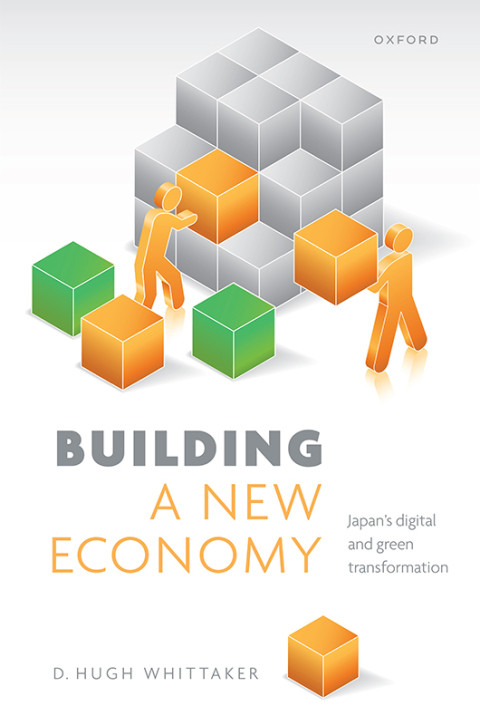

Most ebook files are in PDF format, so you can easily read them using various software such as Foxit Reader or directly on the Google Chrome browser.
Some ebook files are released by publishers in other formats such as .awz, .mobi, .epub, .fb2, etc. You may need to install specific software to read these formats on mobile/PC, such as Calibre.
Please read the tutorial at this link. https://ebooknice.com/page/post?id=faq
We offer FREE conversion to the popular formats you request; however, this may take some time. Therefore, right after payment, please email us, and we will try to provide the service as quickly as possible.
For some exceptional file formats or broken links (if any), please refrain from opening any disputes. Instead, email us first, and we will try to assist within a maximum of 6 hours.
EbookNice Team

Status:
Available0.0
0 reviews
ISBN-10 : 0191997072
ISBN-13 : 9780191997075
Author: D. Hugh Whittaker
Japan is attempting to build a new economy. It goes by various names, such as 'Society 5.0', 'sustainable capitalism', and 'new form of capitalism'. It is to be constructed through digital and green transformation, and a 'virtuous cycle of growth and distribution'. The effort faces strong headwinds, including demographic decline and ageing, Japan's external energy dependence and geopolitical turbulence, and the legacies of Japan's 'lost decades'. Nonetheless, since 2015 a path has been identified that steers between Big Tech market oligopoly on the one hand, and an overbearing state on the other. For others facing the same post-neoliberal, sustainability transformation challenges as Japan, this public-private coordinated building effort is noteworthy. Building a New Economy uses an evolutionary conceptual framework of states-and-markets, organizations-and-technology, and institutional change. It shows how the institutional coherence of the manufacturing-centred postwar model broke down, and was followed by the ideological and institutional dissonance of the 'lost decades'. However, new institutional building blocks have been identified and (partially) assembled which could lead Japan towards a new model which is more open and adaptive. These blocks include a reconfigured developmental state, and new forms of coordination with and within the corporate sector, at times encompassing civil society. Importantly, for a country that has favoured social stability over creative destruction, and has struggled with change, the path forward may require 'controlled dis-equilibrium' of institutions rather than tight coherence. 'Society 5.0' and the 'new form of capitalism' claim to be people-centred; making them so will be the crucial challenge.
1. The Rise and Fall of the Postwar Economy
Change and Continuity in the Japanese Economy
The Rise of the Postwar Economy
Tensions and Emerging Contradictions
The ‘Lost Decades’
Abenomics
Concluding Comments
2. Building and Governing the Digital Economy
Confronting the ‘2025 Digital Cliff’
E-government and the Digital Agency
Cybersecurity
New Industrial and Innovation Policy
Governance for Society 5.0
Concluding Comments
3. The Green Economy
Energy and Greenhouse Gas Emissions
Market Mechanisms: Emissions Trading Schemes and Carbon Taxes
Plastics and the Circular Economy
Resilience
Green Growth Strategy and GX Realization Basic Plan
Concluding Comments
4. Eco Cities, Smart Cities, and Super Cities: Spatial Society 5.0
The Smart City Boom
Smart Cities and Smart City Policies in Japan
Smart City Cases
From Smart Cities to Super Cities
A Note on MaaS
Concluding Comments
5. Innovation and the Shifting Sands of Industry
IT Platforms and Electronics
The Automobile CASE
DX and Financial Services
Entrepreneurship, Startups, and SMEs
Concluding Comments
6. Corporate Governance, ESG, and ‘New Capitalism’
Shareholder Voice and Corporate Governance
GPIF, ESG, and Integrated Reporting
A Reflection on Toshiba
Society 5.0 and ‘New Capitalism’
Concluding Comments
7. People, Skills, and Employment
Supply and Demand for Workers in a Changing Landscape of Work
Dismantling Japanese-style Employment
Covid-19 and Teleworking
Investing in People, Rebuilding the Middle Class
Concluding Comments
8. Beyond Capitalism
The ‘Social and Solidarity Economy’
NPOs and Social Enterprise
Corporations as Social Enterprise
Concluding Comments
9. External Dependencies and Shifting Global Contexts
Changing Economic Interdependence
Economic Security and Defence
Energy Security and Decarbonization
Food Security and Agriculture Revival
Growing EU–Japan collaboration
Concluding Comments
10. Conclusion: Controlled Dis-equilibrium
Overcoming Institutional Stasis: Three Spirits of Japanese Capitalism
The Innovation Dilemma
People-centred Society 5.0?
A New Model?
building an economy
building the new economy data as capital
building the new american economy
building the new american economy smart fair and sustainable
building the new economy data as capital pdf
Tags: Building, New Economy, Japan Digital, Green Transformation, Hugh Whittaker